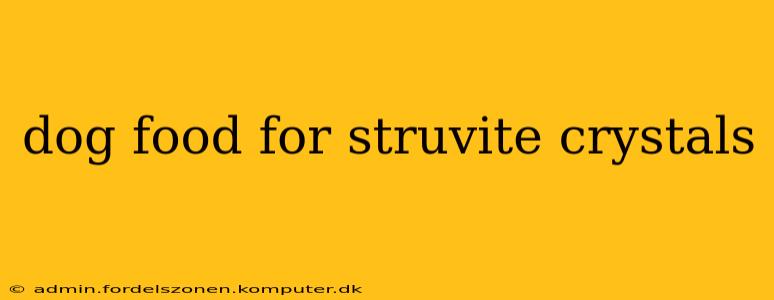Struvite crystals in dogs are a common urinary tract issue that can cause significant discomfort and even kidney damage if left untreated. Understanding how to manage this condition through diet is crucial. This guide dives deep into choosing the right dog food to dissolve and prevent struvite crystals, addressing common questions pet owners have.
What is Struvite and How Does it Affect Dogs?
Struvite crystals are composed of magnesium, ammonium, and phosphate. Their formation in the urine is often linked to an imbalance in urine pH (making it too alkaline), high mineral concentrations, and bacterial infections. These crystals can irritate the bladder lining, leading to painful urination, frequent urination, straining to urinate, blood in the urine (hematuria), and even urinary tract infections (UTIs). In severe cases, struvite crystals can block the urethra, a medical emergency requiring immediate veterinary attention.
What Kind of Dog Food is Best for Struvite Crystals?
The cornerstone of managing struvite crystals is a prescription diet formulated by your veterinarian. These diets are specifically designed to alter the urine's pH, making it less conducive to struvite crystal formation. Crucially, you should never switch your dog's diet without consulting your vet. They will perform tests to confirm the presence of struvite and determine the best course of action. These prescription diets typically focus on:
- Low Magnesium: Magnesium is a key component of struvite. Reducing magnesium intake helps prevent further crystal formation.
- Acidified Urine: These diets help to acidify the urine, lowering its pH and making it less hospitable to struvite crystals. This is achieved through the careful selection of ingredients and the addition of specific acidifying agents.
- Controlled Mineral Content: The diets carefully control the levels of other minerals like phosphorus, which can also contribute to crystal formation.
- High-Quality Protein: Provides essential nutrients while maintaining a balanced dietary profile.
Over-the-counter diets are generally not recommended for managing struvite crystals. While some commercial brands might advertise "urinary health" benefits, they lack the precise formulation and clinical testing of prescription diets. Relying on these could delay proper treatment and worsen the condition.
How Does Diet Help Dissolve Struvite Crystals?
The primary way diet helps is by preventing further crystal formation. By modifying the urine's pH and reducing mineral concentrations, the risk of new crystals forming decreases. While diet alone may not dissolve existing crystals, it significantly contributes to successful management, often working in conjunction with medication prescribed by your veterinarian. Dissolution primarily happens through medications, flushing out existing crystals via increased water intake, and preventing future crystal development.
What are the Signs of Struvite Crystals in Dogs?
Recognizing the signs of struvite crystals is critical for timely veterinary intervention. Common symptoms include:
- Frequent urination: Your dog might urinate more often than usual.
- Straining to urinate: You might observe your dog straining or exhibiting discomfort during urination.
- Painful urination: Your dog may cry out or show signs of discomfort while urinating.
- Blood in the urine: Pink or reddish urine can indicate bleeding in the urinary tract.
- Increased thirst: Excessive water consumption can be a sign of the body trying to flush out crystals.
- Urinary accidents: Your dog might have accidents in the house, even if it's usually housetrained.
- Lethargy and loss of appetite: In severe cases, your dog may appear lethargic and lose interest in food.
Can I Feed My Dog Homemade Food for Struvite Crystals?
Absolutely not without direct consultation and a detailed recipe from your veterinarian. Homemade diets for struvite require precise calculations of minerals and nutrients. Improperly balanced homemade food can exacerbate the problem. Your vet can help formulate a safe and effective homemade diet only after thorough assessment of your dog's condition. This should be considered only in specific cases and under strict veterinary guidance.
What About Supplements for Struvite Crystals?
While supplements might seem appealing, avoid giving your dog any supplements related to urinary health without explicit approval from your veterinarian. Certain supplements can interfere with medications or further disrupt the delicate mineral balance in your dog's urine, potentially worsening the condition.
How Much Water Should My Dog Drink?
Adequate water intake is essential for flushing out urinary tract crystals and preventing their formation. Ensure your dog has access to fresh, clean water at all times. Your veterinarian can provide guidance on the appropriate daily water intake based on your dog's size, activity level, and overall health.
By understanding the role of diet in managing struvite crystals and consistently following your veterinarian's recommendations, you can significantly improve your dog's comfort and overall health. Remember, early intervention and adherence to a prescribed plan are key to successful management.
